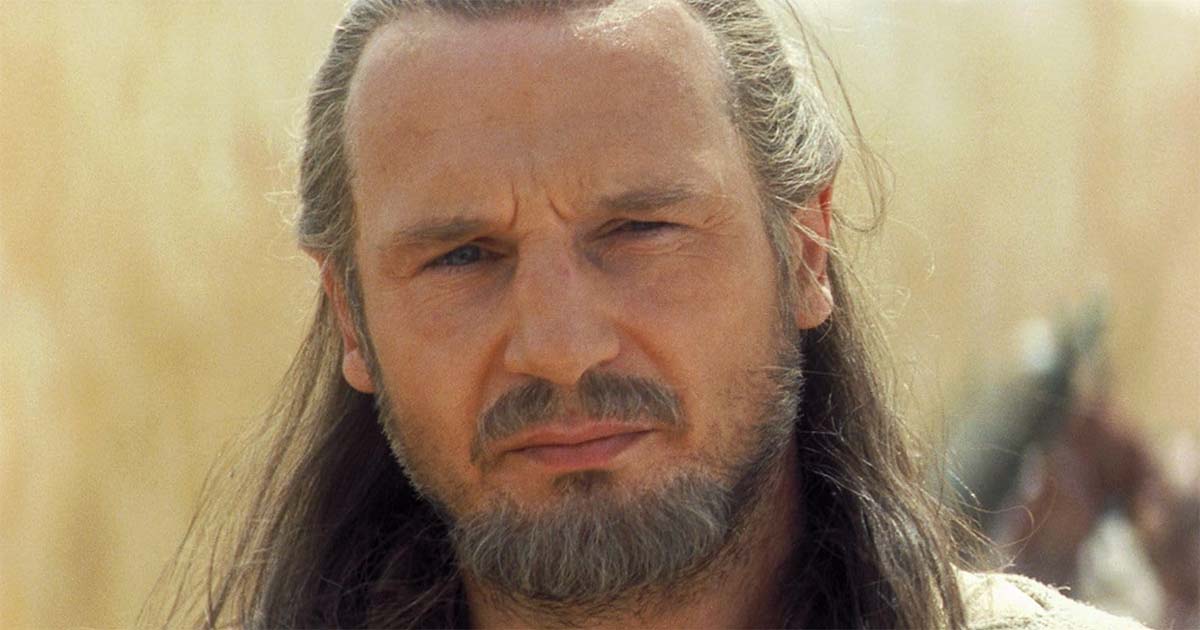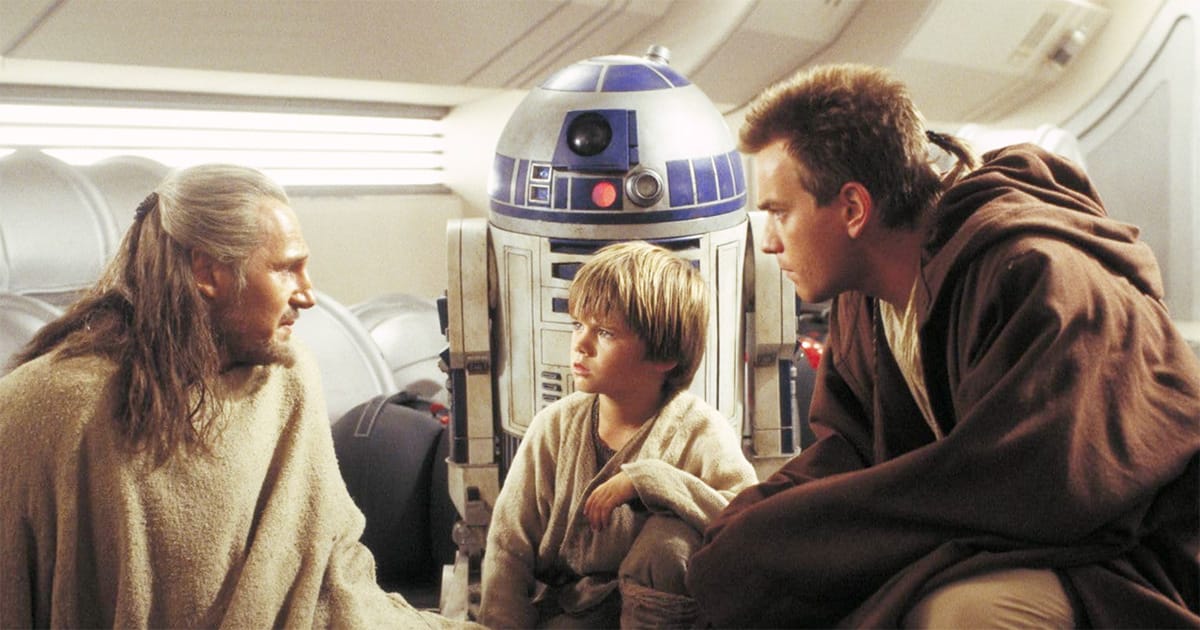Happy Birthday to the Jedi Who Wouldn't Bend to the Council
Happy birthday to Liam Neeson, the man behind Qui-Gon Jinn. This week we honor his role in “The Phantom Menace” and look at why sci-fi mentors always seem to die too soon. Trivia included.

This Week in Classic Science Fiction - Liam Neeson
June 7 is Liam Neeson's birthday. Born in 1952, Neeson took on the role of Jedi Master Qui-Gon Jinn in 1999's "Star Wars: Episode I – The Phantom Menace."
He played it with the kind of gravity and restraint that seemed borrowed from the golden age of Hollywood.
At the time, Neeson was best known for historical dramas. That changed. His turn as Qui-Gon gave George Lucas's prequel trilogy a moral center, and it gave a generation of viewers their first glimpse of what a Jedi Master was supposed to be.
Qui-Gon wasn't just a swordsman. He was a mentor. He was calm, skeptical of bureaucracy, and guided by the Living Force—a man of conviction who quietly broke rules for the right reasons.
He believed young Anakin Skywalker was the Chosen One. The Council disagreed. He trained Obi-Wan anyway. Darth Maul killed him. But before he died, he made Obi-Wan promise to train the boy.
Liam Neeson brought dignity and depth to the franchise. In a series filled with flashy battles and political wrangling, Qui-Gon was something rare: a wise man worth following.
So this week, we remember the Jedi who wouldn't bend to the crowd—and the actor who gave him soul.
Mentors Who Die Too Soon
A good mentor gives a hero something to live for—and then dies before the job is done.
It happens again and again in science fiction. A teacher shows up full of wisdom and promise. He helps a younger man take his first step toward greatness. Then, just as the path comes into view, the mentor falls. It's abrupt. It's unfair. And it's essential.
Think of Qui-Gon Jinn in "Star Wars: Episode I – The Phantom Menace." By the time he shows up on screen, Qui-Gon already feels like a legend. Calm. Decisive. And different. He listens to the Force, not the Council. He frees Anakin Skywalker and insists the boy be trained—even as the other Jedi hesitate. (We are assuming this is a good thing.)

Then, just like that, he's gone. Darth Maul stabs him through the gut. Qui-Gon dies in Obi-Wan's arms, making him promise to train the boy. And we all know how that turns out.
That's the risk of this trope. The mentor doesn't just die. He leaves behind a half-formed hero, a world still in crisis, and choices that echo for decades. It's tragedy with purpose. Not just for the characters—but for the viewer too.
The Purpose of the Fall
In traditional storytelling, especially the kind that values courage and discipline, the mentor often dies to force the hero to grow. It's a hard shove out of the nest.
When Gandalf falls in Moria in "The Fellowship of the Ring," the hobbits—and even Aragorn—are left to lead without him. When Professor X dies in the "X-Men" comics, or Obi-Wan lets Vader strike him down, the pattern repeats. The guide becomes a memory. The apprentice has no choice but to step up.
In each case, the loss teaches something. It forces resolve. It exposes weaknesses. It moves the story forward—violently, sometimes—but meaningfully.
But why must the mentor die?
One reason is that science fiction tends to be about potential—what the future could be, what man might become. If the wise man sticks around too long, he limits that potential. The young hero won't take risks. He won't lead. He'll stay a student forever.
So, the story makes a brutal cut.
Variations on a Theme
Not all mentor deaths are as noble as Qui-Gon's. Some are rushed. Some are bitter. Some happen off-screen. But they serve the same role.
In "Logan's Run," Peter Ustinov's character—the old man who keeps cats and quotes T.S. Eliot—acts as a mentor of sorts. He doesn't die, but he's too old to follow Logan and Jessica back to the city. His wisdom lingers, but he's removed from the action. That's another version of the trope: the sidelined elder. A mentor who survives but can't help any further.
In "Battlestar Galactica" (the original series from 1978), Commander Adama survives, but other guiding figures fall. It's a show where the line between mentor and commander is blurred—and often fatal.
And in "The Matrix," Morpheus might not die, but he's captured and sidelined long enough to force Neo into belief. The effect is the same. The student is forced to act.
Even in lesser-known films like "Krull" (1983), the pattern holds. The Old One—played by Freddie Jones—guides the hero and then dies before the final battle. He isn't there to see the victory. He just lights the way.
Real Consequences
What makes these mentor deaths resonate isn't just their function. It's what they cost.
Qui-Gon Jinn's death didn't just shape Obi-Wan. It changed galactic history. If Qui-Gon had lived, would Anakin have fallen? Would the Jedi have survived? Would the Clone Wars have happened at all?
That's the heart of the trope. The mentor dies too soon—and because of that, things go wrong.
It's not just about growth. It's about loss. Real loss. The kind that men know too well. A father dies. A coach disappears. A pastor retires. Suddenly, the burden of decision is yours. And you weren't ready.
Science fiction, at its best, reflects those moments. It lets the viewer relive them—safely, perhaps—but with weight.
A Note on Timing
What makes a mentor's death hit hardest is timing. If it comes too late, the story has no sting. If it comes too early, we feel robbed.
Qui-Gon's death happens at the end of "The Phantom Menace." We've just begun to understand who he is—just started to admire him. And then he's gone. That's why it works.
It's the same reason Yoda's death in "Return of the Jedi" feels different. Yoda dies peacefully at the end of his arc, with his lessons finished. It's satisfying—but it doesn't haunt you. Qui-Gon's death haunts.
The Wisdom That Remains
Mentors who die too soon leave behind something besides grief: memory. Their words. Their example. The fact that they almost made it.
In "The Last Starfighter" (1984), Centauri dies (or so we think) after recruiting Alex Rogan to defend the galaxy. The boy must complete the mission alone. But Centauri's confidence—his belief—stays with him. That's the secret. The best mentors don't just teach. They inspire.
So we remember Qui-Gon. We remember Gandalf's fall, Obi-Wan's sacrifice, and every wise old man who was taken before his time. They shaped heroes who weren't ready.
That's life. That's story. And that's science fiction.
"Mentors Who Die Too Soon" Trivia
- Liam Neeson agreed to play Qui-Gon Jinn after only reading the script once, saying he wanted to work with George Lucas and loved the spiritual quality of the character. He later voiced Qui-Gon again for The Clone Wars and Tales of the Jedi.
- Alec Guinness, who played Obi-Wan Kenobi in the original Star Wars (1977), requested that his character be killed off early. He believed Obi-Wan's death would lend dramatic weight and simplify filming—Guinness wasn't a fan of science fiction.
- In The Fellowship of the Ring (2001), Gandalf's fall in Moria was inspired by mentor-sacrifice traditions in myth and literature. Tolkien modeled Gandalf's death-and-return arc on early Christian symbolism, particularly the idea of resurrection after self-sacrifice.

